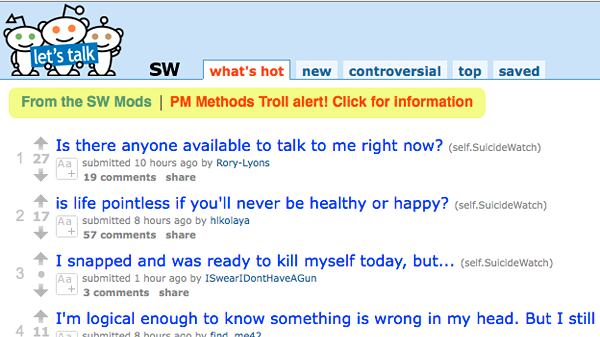Shortly after 5 a.m. ET on Tuesday, March 6, someone with the username i856 posted to a message board on the social-networking giant Reddit. “I’ve taken a half bottle of vodka and around 9 ecstasy tablets,” i856 wrote. The post, on Reddit’s Suicide Watch page, continued in plain, painful language: “My grandfather and older brother are downstairs. I really regret doing this as I’m probably going to go into a wild fit very shortly. I just want this all to end, I am so unhappy it feels like it’s physically hurting me.”
Within 15 minutes, i856’s post got attention. “First of all, you are not going to die,” counseled the first responder, Calimhero. “Go tell your family downstairs, you need to go to the hospital. Don’t worry, you’ll be ok.”
Others took a more urgent approach. “Go throw up RIGHT NOW!!!” implored ladyassassin. “If you can’t call the ambulance and have them pump your stomach. You regret it now, you will regret it even more in 30 minutes.”
“And then come back and talk to me,” ladyassassin added.
Over the ensuing hours, other commenters chimed in with messages of solace and encouragement, but i856 did not post again.
For those with severe depression or suicidal feelings, the landscape of emergency support is changing rapidly—and it isn’t clear that it’s always for the better.
Telephone hotlines have long been the go-to resource, providing an opportunity to hear a soothing, understanding voice on the other end of the line. But today’s teens use texts and the Internet far more than phones. This has triggered the growth of online suicide-prevention resources, professional and otherwise, which means that one of the most delicate and least-understood types of mental-health intervention is confronting a new, complicated tangle of practical and ethical issues.

“Young people are not phoning—not in the numbers that their risk factors would indicate they should,” Roberta Hurtig, executive director of the suicide hotline Samaritans Boston, explained in an email. “Just as at one time people couldn’t imagine people phoning a stranger … for support, we see a time when reaching out electronically will be the norm—and we need to keep pace of these changing patterns of communication.”
Reaching out electronically is, of course, already the norm for millions of young people across America. Reddit, unlike Samaritans, is a household name among teenagers and young adults: the website had 35 million unique visitors last month, according to a Google online analytics tool; about half of them were under 35. Most of these users—and young Internet users in general—are unlikely to know the difference between a decades-old professional organization like Samaritans and whatever comes up as the result of an anguished late-night Google search.
And there’s no question that Suicide Watch’s crowdsourced model addresses some logistical weaknesses of the Samaritans and similar organizations, the most obvious being horsepower: hotline volunteers receive dozens of hours of training and supervision to handle calls, which significantly reduces the number of people available. Since 15 minutes “costs” 15 minutes of a volunteer’s time, there are never enough volunteers to go around. (The National Suicide Prevention Lifeline receives 800,000 calls per year that are routed through about 150 call centers, many of which are short-staffed.)
On Suicide Watch, in contrast, there are already 10,000 subscribers (not all are active users), and each “volunteer” drops in and out at his or her convenience. In the aggregate, spread across many time zones, they seem to be able to provide a good amount of coverage. This may be a critical difference for a generation reared on instant messaging and T1 connection speeds. On Tuesday night, someone with the username Rory-Lyons posted to Suicide Watch, “I tried to contact the National Suicide Prevention Lifeline and they put me on hold.”
But, of course, with this efficiency comes pitfalls.
For starters, anyone with a Reddit account (which takes about 30 seconds to set up) can respond to a Suicide Watch post. The majority of commenters on the site are supportive, kind, and empathetic—but not all.
“Your mother is right to hate you,” read one comment. “Please do the world a favor and kill yourself.”
“Do it, you p*ssy,” read another.
Both comments were promptly deleted by moderators, or “mods,” without whom Suicide Watch would probably come apart at the seams. At the moment, there are 10 mods, and they do everything from “troll hunting” (that is, deleting the comments and banning the accounts of those who write abusive posts) to writing public-service announcements for the site’s users.
One mod, a 40-something Frenchman named Nicolas, said he spends between two and eight hours a day on the site, mostly hunting trolls and moderating comments, but also occasionally responding to posts made by users looking for help. Nicolas, who asked that his last name and exact age be withheld, knows firsthand the sort of attention that a suicidal person needs.
“I almost killed myself because of a girl, a bad childhood and a good dose of PTSD in the late nineties,” Nicolas wrote in an email. “Therapy and antidepressants saved my life.”
Despite the mods’ best efforts, they can’t catch everything, particularly if a troll sends a direct private message to a poster.
It is a potentially disastrous issue. “From my clinical experience, I would take ‘trolls’ VERY seriously,” Karen Norberg, an epidemiologist and child psychiatrist who studies suicide at the National Bureau of Economic Research, said in an email. “The classic equivalent is the guy on a building ledge, and the people in the crowd yelling ‘jump! jump!’. That bitter push can indeed push him to jump.”
Reddit is familiar with the jumpers. In August 2010, a 24-year-old man named Robert C. Duncan logged onto Reddit and wrote, “Give me one reason why i shouldn’t end it right now.” Several trolls heaped abuse on him, and two hours later he was dead. Though Duncan had posted not to Suicide Watch but to the much broader Reddit community, his death was a tragic reminder of the seriousness of many of these sorts of cries for help.
In an interview, Reddit’s GM, Erik Martin, expressed cautious support for Suicide Watch. “They’re doing a lot of good work, but any discussion of suicide is problematic because it can have the effect of encouraging copycat-type stuff. In addition to just, you know, trolling and that kind of thing.”
Most Suicide Watch commenters are not trolls, but even the site’s well-intentioned commenters can take the wrong route. One recent poster said he was feeling suicidal in part because “debt collectors [were] chasing me down.” The responses were kind, but not necessarily what the poster needed. “Some debts can be consolidated nicely,” one wrote.
“About a quarter to a third of the people who drop by and start commenting with good intentions are somewhat to seriously misinformed about how to help,” a mod named SQLwitch said in an email. “Almost all of them either smarten up on their own when things don’t go as they expect, and either change their style or stop participating.”
Samaritans, in contrast, are trained never to give practical advice, and never to try to solve callers’ problems. They are there to listen and to offer empathy, in part because they are not qualified to solve callers’ myriad financial or sexual or emotional problems, but also because many of those problems are intractable; some people will suffer from debt or chronic pain or impotence for the rest of their lives. (Full disclosure: I volunteered for the Samaritans last year, when I lived in Cambridge.)
A trained suicide-hotline volunteer can also sift out the callers who are imminent threats to themselves from the much more common class of caller, who is suffering but not teetering at the edge of suicide. On the Internet, these distinctions are less clear, and the help is therefore less focused.
Although both the traditional hotlines and the new online groups have their shortcomings, suicide-prevention specialists say there can be room for both.
“[If] somebody’s in acute crisis, if they’re calling and they need to be seen by somebody right away or someone needs to call 911, then it’s helpful to have a telephone response,” said Norberg. “But that’s just a fraction of the number of calls that come into a phone-based system.”
Reddit didn’t institute any major changes to how the site works in the wake of Duncan’s death, since the sorts of safeguards that would guarantee protection from the trolls—prescreening of comments and private messages—are diametrically opposed to the site’s open-source ethos.
But both support systems have taken tips from each other. Suicide Watch provides links and phone numbers to the major suicide-prevention hotlines and organizations.
And Samaritans recently launched IM Hear, a service in which trained teens instant-message with struggling peers. Other suicide hotlines, from central New Jersey to Baton Rouge, are following suit, and have launched or are launching online chat services. In December, Facebook launched a service to connect possibly suicidal users to the NSPL.
So what became of i586? We may never know. Perhaps he—assuming it was a he—had not in fact attempted to overdose, but was simply a bored teen looking for attention. Either way, we can’t ascertain whether he got the help he needed.
Martin, Reddit’s GM, said he appreciates those who comment on Suicide Watch, but recognizes the limitations of this form of support.
“These are in some cases very experienced and caring people, but they’re not necessarily professionals,” Martin said. “This is crowdsourced—it’s a community of people from all over the world, all different backgrounds and experience levels with this kind of thing, so it’s definitely really nuanced.”
The nuance can cut many ways. On Wednesday morning, barackobamamama posted the following in response to i856: “People need to stop fucking telling him he’s not going to die, because it could just motivate him to take something else. Seriously, people, use your goddamn heads.”






